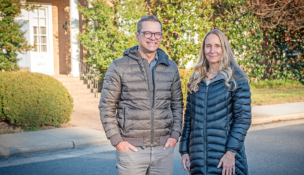
Edward Silva successfully built a search fund and acquired a Virginia business that he remains an investor in. Photo courtesy Edward Silva

Edward Silva successfully built a search fund and acquired a Virginia business that he remains an investor in. Photo courtesy Edward Silva
Search funds grow in popularity for entrepreneurs
SUMMARY:
- A search fund offers a path to own and operate an established business.
- Search funds are somewhat new to Virginia, but they’re growing in popularity.
- Virginia is well-positioned for search fund investment because of its business-friendly climate and relatively low cost of living.
- Generational shifts are driving interest in professional autonomy.
Coming from Stanford University, Edward Silva was well aware of the power of search funds, a less risky way to build a self-owned business.
H. Irving Grousbeck, who co-founded Continental Cablevision and started the Stanford Center for Entrepreneurial Studies, coined the phrase “search fund” in 1984, referring to people who seek funding from investors and then “search for, acquire and lead a privately held company for the medium to long term, typically five to 10 years,” according to the Stanford CES’ 2024 study on search funds.
Although search funds are popular on the West Coast, they’re just getting started in Virginia. The Stanford study shows why it’s lucrative. Nearly 70% of the 681 search funds researchers examined in the United States and Canada were profitable. But Virginia had only nine search-fund-acquired businesses in the study, compared with 55 in California.
Yet Silva views it as a growing trend in the commonwealth.
After graduating from Stanford, the California native built a search fund and acquired Charlottesville-based másLabor, which connects businesses with migrant workers coming to the U.S. on H2-A and H2-B work visas, from prior owner Libby Whitley, who was retiring, and he moved his family to Virginia in 2021. Whitley, Silva explains, did not want to sell her self-built business to a corporate conglomerate or private equity firm.
“As neither of those things, I gave them a nice alternative to get paid well and make sure their business still carried out their legacy,” says Silva.
He grew the business, acquiring and merging it with Georgia-based AgWorks H2 in 2022, into a firm that brings in more than 70,000 foreign laborers annually.
Silva left másLabor last year but remains an investor in the company. He’s in the process of another search, this one self-funded, for a Virginia business he hopes to grow. He says the commonwealth is well-positioned for such investment because of its relative tax-friendliness, a deep pool of available business talent and affordable cost of living.
Those factors and a shift in ideology spurred by the COVID-19 pandemic, Silva says, have helped the search fund model see a lot of success in Virginia.
“You had all these people who, for one reason or another, their life was being reevaluated,” Silva says. “A lot of people wanted more freedom, more autonomy.”
Generational appeal
When Megan McGee graduated from Florida State University, she began her career working for a handful of small businesses in the Sunshine State.
A child of small business owners, McGee saw the impact they can have in their communities. But what she didn’t know was “how the heck can you start a business or buy a business of value if you don’t have millions of dollars yourself?” she says.
So she enrolled at the University of Virginia’s Darden School of Business to find the answer.
It was there that McGee learned about entrepreneurship through acquisition — the idea of acquiring already-successful small-to-medium-sized businesses rather than starting from scratch.
“At first I thought it was fake,” McGee says. “It sounded too good to be true: Somebody who barely knows me will give me hundreds of thousands of dollars, potentially millions of dollars, to buy a company and make me CEO.”
After a brief foray as a searcher, as such entrepreneurs are known, McGee pivoted to education. She advises students as the director of entrepreneurship through acquisition at Darden’s Batten Institute for Entrepreneurship, Innovation and Technology.
Joel Ankney, who operates Virginia Beach-based Ankney Law, has made his living for nearly a decade assisting searchers when it comes time to close deals.
“Virginia, at least in my purview, is just starting to talk about it,” Ankney says of search funds. “It’s a hot topic right now. Very hot.”
Ankney closes between 20 and 25 transactions per year, and most of his clients are self-funded searchers. Most use federal Small Business Administration loans capped at $5 million, so the businesses changing hands are relatively small and typically in service industries, everything from construction equipment firms to custodial services. As with Silva, many searchers are younger professionals purchasing businesses from baby boomers who are looking to retire.
Silva sees the trend catching on in Virginia for the same reasons he chose to move here from California — lower cost of living, business-friendly policies and plenty of skilled employees. McGee agrees.
“I’m working with more students who want to search, acquire and operate a business, and they specifically want to stay in Virginia,” the U.Va. educator says.
And McGee doesn’t see this trend slowing down when she looks at Gen Z, millennials and beyond.
“People like autonomy,” she explains. “We’re seeing fewer people staying at the same job for decades at a time.”
t

















